- Home
- Chris Wraight
STARGATE ATLANTIS: Dead End
STARGATE ATLANTIS: Dead End Read online
Dead End
Chris Wraight
An original publication of Fandemonium Ltd, produced under license from MGM Consumer Products.
Fandemonium Books
PO Box 795A
Surbiton
Surrey KT5 8YB
United Kingdom
Visit our website: www.stargatenovels.com
©2011 Metro-Goldwyn-Mayer. All Rights Reserved. Photography and cover art: ©2004-2011 MGM Global Holdings Inc. All Rights Reserved.
METRO-GOLDWYN-MAYER Presents
STARGATE ATLANTIS™
JOE FLANIGAN TORRI HIGGINSON RACHEL LUTTRELL JASON MOMOA
with PAUL McGILLION as Dr. Carson Beckett and DAVID HEWLETT as Dr. McKay
Executive Producers BRAD WRIGHT & ROBERT C. COOPER
Created by BRAD WRIGHT & ROBERT C. COOPER
STARGATE ATLANTIS is a trademark of Metro-Goldwyn-Mayer Studios Inc.
© 2004-2011 MGM Global Holdings Inc. All Rights Reseved.
WWW.MGM.COM
No part of this publication may be reproduced, stored in or introduced into a retrieval system, or transmitted, in any form, or by any means (electronic, mechanical, photocopying, recording or otherwise) without the prior written consent of the publisher. Any person who does any unauthorized act in relation to this publication may be liable to criminal prosecution and civil claims for damages.
With many thanks to the Fandemonium team, especially Sally Malcolm, for superlative editing, guidance and criticism.
Author’s Note
This story takes place during the early episodes of series three, before the discovery of the Asurans or the construction of the McKay/Carter Intergalactic Gate Bridge.
Contents
Chapter 1
Chapter 2
Chapter 3
Chapter 4
Chapter 5
Chapter 6
Chapter 7
Chapter 8
Chapter 9
Chapter 10
Chapter 11
Chapter 12
Chapter 13
Chapter 14
Chapter 15
Chapter 16
Chapter 17
Chapter 18
Chapter 19
Chapter One
“OK, remind me again why I agreed to come down here with you?”
Lt Col Sheppard was not in a good mood. Introducing Ronon to poker last night had been a good idea; introducing him to bourbon had not. The Satedan could put away a phenomenal amount of the stuff without even blinking. Sheppard’s aching head, on the other hand, was witness that its effects on human physiology were the same as they had always been. The last thing he needed now was a morning with McKay at his most irascible.
“Because your devotion to duty knows no bounds, and I need your impeccable scientific credentials,” said McKay. “That, or Zelenka’s laid-up sick and you’re the next best thing. And you never know when that ATA gene will come in handy.”
Sheppard scowled and ran his fingers over his throbbing forehead. There were times when, despite all the provocation, he actually liked McKay. This was not one of them. He looked back at the four-strong team of marines stationed a few yards away in the corridor. They looked faintly sympathetic.
“It’d better be important,” Sheppard growled, turning his attention back to the scientist. He was working away at the dismantled Ancient computer panel. “If you don’t get this open in ten minutes, I’m outta here.”
McKay turned around to face him, irritation written all over his face. “Oh, like what?” he snapped. “What’s more important than finally getting to the bottom of this place? I mean, you might be happy spending your time in a city where we only understand half of what anything does, where the power ratios fluctuate every time Ronon sneezes, and where the machinery we do know about could fry the lot of us in a nanosecond if we happen to flick the wrong switch. Forgive me, but I’m not.”
Sheppard gave him a warning look. McKay might technically be out of his chain of command, but there was a limit to how much crap he’d put up with.
“And your time is, of course, most appreciated,” said McKay, taking the hint. “I’m almost done. Just a few more moments.”
Sheppard gave a curt nod. The movement hurt his head. “Make it quick.”
The two men were deep in the bowels of the Ancient city. After their last prolonged battle against the Wraith, a rare window of opportunity had opened. For once, scientific research had taken priority over survival and the civilian staff were making the most of it. Not that Sheppard minded that. It felt like they’d been high-tailing it from one crisis to another ever since arriving in the Pegasus galaxy. If the price of a little peace was making McKay even more insufferable than usual, it was probably still worth paying. In any case, they all knew the lull was only temporary.
Rodney turned back to his work. There were Ancient devices all over the polished floor, some retrieved from other parts of the city, some taken from the hole in the wall McKay was investigating. The gadgets, all of which were more or less meaningless to Sheppard, were mixed up with McKay’s own equipment: oscilloscopes, signal processors, metal detectors, and Venusian death-rays. OK, so the last one was probably made up. But knowing McKay, only probably.
“This place has been out of action for a long time,” came McKay’s muffled voice from halfway inside the wall cavity. “I don’t think it’s been shielded for any particular reason. It’s just that the systems have malfunctioned and the access doors have locked down.”
“Reassuring,” said Sheppard, watching McKay fiddle with electronics behind the open panel. Wires and transparent circuit boards poked from the gap like entrails. “Like these places have never been wired before.”
Bitter experience had taught the team to be very careful with unexplored parts of the city. Hence the marines. From the looks on their faces, it was clear they didn’t relish being down here any more than he did.
“Ha!” cried McKay. “That’s it. The field harmonics have distorted due to the burnt-out intake manifold. I thought it must be something like that.”
“Yeah, me too. Suppose you tell me what that means?”
To his right, there was suddenly a low hiss. The marines perked up, and raised their weapons. With a click and a sigh, an entire section of wall slid smoothly back and upwards. What had been a blank, unremarkable section of corridor now revealed a second chamber. McKay pulled himself out of the mess of cables and circuitry, looking smug.
“It means, Colonel, that I’ve got us in,” he said. “Whatever delights have been hidden in here for 10,000 years are about to be revealed.”
“Not so fast,” said Sheppard, hefting his P90 and gesturing to the marines to back him up. “We’ll take this nice and slow.”
With the marines behind him, Sheppard inched towards the open doorway. The room beyond was about ten meters in diameter and octagonal in shape. The usual geometric Ancient patterning stretched across all of the eight walls. A low light filtered upwards from wells near the floor, bathing the space in a dim orange. Like most of the rooms in the city, there was a minimum of clutter. The Ancients had never been ones for fussy interior decor. The only item of note was a raised column in the very center, perhaps three feet tall. It was also octagonal, and a selection of symbols glowed gently on its smooth top. It looked like a control panel.
Sheppard could hear McKay itching to come in, but the Colonel was in no hurry. His headache was still bad, and the scientist would have to wait. With a flick of his fingers, he motioned for the marines to fan out and check for anything untoward. With a cool efficiency, they began to sweep the walls. Sheppard walked over to the far wall, scouring the patterned surface for clues to the room’s
function.
“Oh, come on!” cried McKay impatiently from the corridor outside. “It’s a minor control chamber of some sort. You don’t need to—”
There was a muffled explosion. The orange light flickered and a warning klaxon began to wail. Slowly, the central column started to sink into the floor.
“Get out!” yelled Sheppard, darting back towards the door. The marines tore across the chamber. He just had time to see the last of his men slip through the gap before the wall section slammed shut in front of him. He was trapped inside. The klaxon continued to blare. Within the enclosed space, the noise echoed alarmingly. The central column carried on sinking into the ground.
“Rodney!” he shouted. “Wanna tell me what’s going on?”
From the far side of the wall, McKay’s voice sounded faint and indistinct. “I don’t know!” he yelled. “One of your men must have set something off!”
Sheppard slammed his fist against the doors in frustration, then took a breath. Whatever was happening in the chamber was happening quickly; the column was now barely a foot above ground level and he ran over to it. There were Ancient symbols on the surface, still glowing, and the thing looked a lot like a DHD. But if there was a DHD, where was the gate? He looked up at the ceiling. Nothing. The column continued to descend, the klaxon continued to blare.
“Rodney, get this thing the hell open!”
“Trying, Colonel!” came the muffled response. “It seems to have gone into some kind of shutdown sequence! I’m working on it!”
That was not reassuring. Sheppard stepped back from the column, now nearly flush with the floor, and looked around. That’s when he noticed the ceiling was sinking.
“Oh, great,” he breathed, watching the rapidly descending arches.
He raised his P90, but the gesture was pointless. For once, it couldn’t save him.
“Losing headroom in here, Rodney…”
He thought he heard a curse coming from the far side of the door. Sheppard dropped to his knees next to the sunken column. Nothing happened to the klaxon, nor to the slowly descending roof. The control panel surface was now level with the floor, and the glow had disappeared. The six Ancient symbols were still visible. Frantically, Sheppard pressed them in turn. Nothing. He tried in reverse order. Still nothing. He glanced up — the ceiling was now just a few centimeters from his head — and sank to his belly, letting his weapon clatter to the floor.
“Rodney!” he yelled. “You’re gonna have to work this out quick, or I won’t be needing those slimming classes!”
“I’m on it!”
The ceiling crept down further. Sheppard tried the sequence again. Clockwise. Anti-clockwise. Random. His fingers were slick with sweat, his breath short and sharp, as the ceiling drew relentlessly closer. What a way for a pilot to go.
He slammed his fist against the symbols. Something sprang free from a slot in between them. It bounced back down as it hit the ceiling. Sheppard grasped it frantically, desperate for anything. It was a shard of translucent matter, some kind of Ancient computer component. Not very helpful.
Then, with a shudder, the doors slid open. Booted feet filled the narrow gap and two marines threw themselves to the floor, arms extended into the chamber.
“John!” cried McKay. “Over here!”
Sheppard scrabbled round in the tight space and squirmed towards the exit. As he went, the irregular surface of the ceiling scraped against his body armor. Something snagged, but he thrust himself forward. Hands grabbed his arms. He was yanked out through the doorway. As his feet were pulled free, there was a dull slam behind him.
Shakily, he looked back. Through the open doorway, there was nothing but solid metal. The device had been well and truly shut down.
He took a deep breath and gingerly hauled himself up. That had been too close.
“You okay?” McKay’s face creased with concern. He had that rare guilty look he wore when he knew something had gone wrong and it was probably his fault.
“What do you think?” asked Sheppard, recovering his poise. “You want to tell me what just went on in there?”
“I may have, er, crossed a few wires,” he said, flustered. “These things are complicated. But that shouldn’t have happened!”
“No kidding.”
McKay scowled. “Anyway, we’re not going back in. Whatever was in that room is lost for good.”
Sheppard brushed his uniform down, his heartbeat returning to normal. “We might get something out of it,” he said. “There was a gate address in there. And this.”
He held up the shard he’d retrieved. McKay snatched at it eagerly, his air of embarrassment quickly lost.
“An address?” McKay’s eyes lit up. “And what looks like some kind of data panel. Or what’s left of it. Interesting. Perhaps it’s some kind of—”
Sheppard held his hand up.
“Enough already,” he said. “I’m getting this place locked down and off-limits. Then I’m gonna brief Weir on the fun and games. You might want to consider joining me.”
McKay gave a dramatic sigh and folded his arms in irritation. Sheppard ignored him, signaling the marines to regroup and follow him. As he made to leave, he paused and threw McKay a dry smile.
“Cheer up, Rodney. At least you cured my hangover.”
Weir leaned forward in her chair and fixed McKay with a steely look.
“You did what?”
McKay shifted uncomfortably in his seat. “Look, how was I to know they’d go all Indiana Jones on us? It doesn’t make any sense. I mean, it’s pretty clear the Ancients were a kooky bunch, but even so…”
Weir’s eyes flicked across to Teyla, but the Athosian remained unperturbed. Her respect for the Ancestors may have been dented in recent months, but she still had the potential to balk at Rodney’s casual references to them.
“Alright,” Weir said, running her hands through her hair. “Let’s try and get something useful out of this. Give me your best shot — what was in that room?”
Weir sat at the head of the table in the conference room. A few hours had passed since the incident. Despite the seriousness of what had happened, the interruption to an already overloaded schedule was unwelcome. It wasn’t as if they didn’t have enough problems coming from outside the city. Sheppard, McKay, Zelenka, Teyla and Ronon also sat around the table — John looking a little paler than usual, but otherwise unharmed. He seemed to have a knack for getting out of these situations unscathed. It was a good quality to have in a military commander.
McKay leant forward and clasped his hands together on the table.
“Here’s my hypothesis,” he said. “I’ve had a quick look at the failsafe mechanism — the pile of metal that nearly flattened the Colonel. It’s designed to withstand massive force. We can surmise that the walls and floor are similarly constructed. Clearly, the chamber was built to contain huge amounts of energy.”
Weir listened carefully. McKay could be a pompous windbag when he thought he was on to something, but his hunches had a way of proving correct.
“Combine that with what Colonel Sheppard told us about a DHD-like machine in there,” McKay continued, “and I think what we’re looking at is a prototype transport mechanism. Either something to do with the city’s Stargate, or perhaps even a replacement for it entirely.”
Weir could see Zelenka’s skeptical expression.
“Why would the Ancients build such a thing?” he said. “They had the gates. Sounds implausible.”
McKay turned on him. “Have you looked at it?” he snapped. “No, you were in bed wiping your nose. Before you start questioning my judgment, you should do your own research.”
Zelenka was about to retort, but McKay plowed on.
“I’m not just stabbing in the dark here. The Colonel managed to retrieve something from the control mechanism. He didn’t use as much finesse as I’d have liked, so it’s in pretty bad shape.”
“I was kinda engaged with other stuff,” sighed Sheppard. “Like staying a
live.”
“And we’re all very glad you did. Thankfully, it’s still usable, and I’ve seen stuff like it before.” As he spoke, McKay flipped up the lid of his laptop and punched something into its keyboard. The translucent panel Sheppard had retrieved was jutting out from one of the custom ports in the machine. “Take a look at the screen.”
All swung round to look at the screen in the corner of the room. The display turned into a mess of green zigzags.
“Nice pattern,” said Sheppard. “Like what you’ve done with that.”
“Thanks to some rough handling, we’ve lost most of the visual,” McKay said. “Audio’s intact, though. Keep listening.”
On the screen, the zigzags began to break up. It looked like there was a figure addressing them, though it was impossible to make out features. Over a backdrop of static, he or she was speaking. Chunks of speech were muffled or distorted, and only scattered fragments came through.
“… returning Lanteans … list of priorities … three settlement programs on … ensure that we … do not neglect the … Telion is insistent on … coordinates in prototype gate device … do not neglect what we left …”
Then the voice broke up, and what little picture there was dissolved into a green snowstorm. McKay flicked the display off.
For a moment, there was a hush around the chamber. It wasn’t the first time they’d seen footage of Ancients, but the experience never quite lost its air of strangeness.
“Can you get anything more out of the recording?” asked Weir, turning back to the table.
“Believe me, I’ve tried,” said McKay. “That’s as good as we’re going to get. But it’s enough, right? You’ve figured out what it means?”
“Perhaps you could enlighten us with your opinion,” said Teyla.
“Look,” explained McKay, giving his favorite wearied expression. “The Lanteans always intended to come back here if they could. This must have been a message to those returnees. Some kind of standing orders, in the event the city was reactivated. Whatever was being worked on in that room need to be revisited. Perhaps they didn’t have time to finish off whatever they started.”

 Two Metaphysical Blades
Two Metaphysical Blades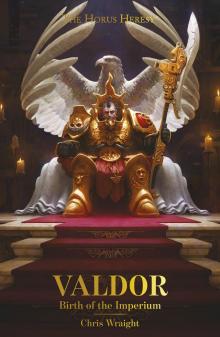 Valdor: Birth of the Imperium
Valdor: Birth of the Imperium JAGHATAI KHAN WARHAWK OF CHOGORIS
JAGHATAI KHAN WARHAWK OF CHOGORIS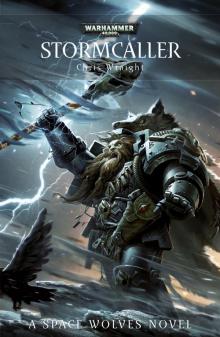 Stormcaller
Stormcaller Child of Chaos
Child of Chaos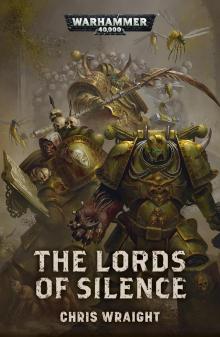 The Lords of Silence
The Lords of Silence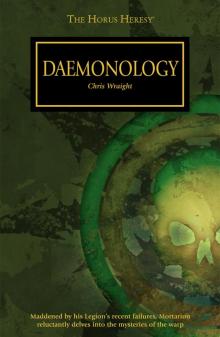 Daemonology
Daemonology Swords of the Emperor
Swords of the Emperor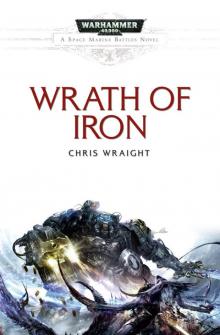 Wrath of Iron
Wrath of Iron Brothers of the Storm
Brothers of the Storm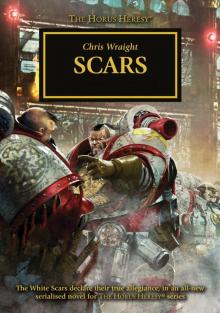 Horus Heresy: Scars
Horus Heresy: Scars The Sigillite
The Sigillite The End Times | The Fall of Altdorf
The End Times | The Fall of Altdorf The Path of Heaven
The Path of Heaven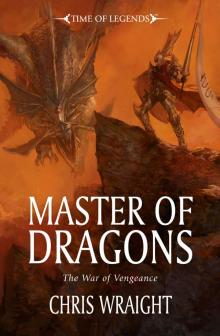 Master of Dragons
Master of Dragons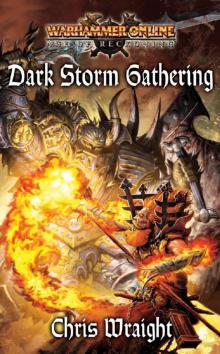 WH-Warhammer Online-Age of Reckoning 02(R)-Dark Storm Gathering
WH-Warhammer Online-Age of Reckoning 02(R)-Dark Storm Gathering Wulfen
Wulfen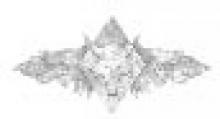 Battle Of The Fang
Battle Of The Fang Onyx
Onyx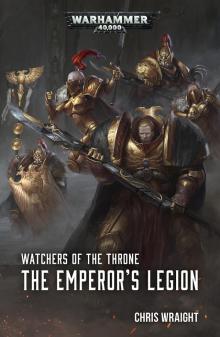 Watchers of the Throne: The Emperor’s Legion
Watchers of the Throne: The Emperor’s Legion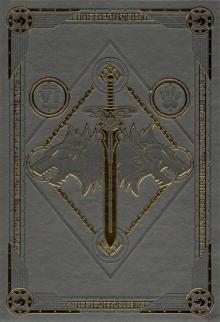 Leman Russ: The Great Wolf
Leman Russ: The Great Wolf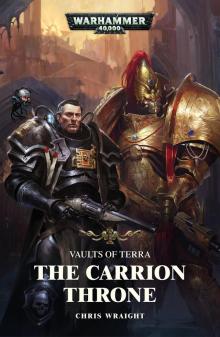 Vaults of Terra: The Carrion Throne
Vaults of Terra: The Carrion Throne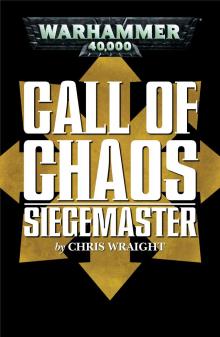 Siegemaster
Siegemaster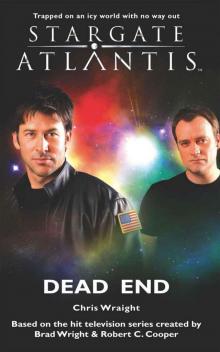 STARGATE ATLANTIS: Dead End
STARGATE ATLANTIS: Dead End Scars
Scars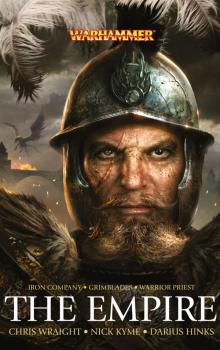 The Empire Omnibus
The Empire Omnibus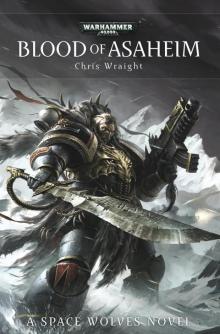 Blood of Asaheim
Blood of Asaheim